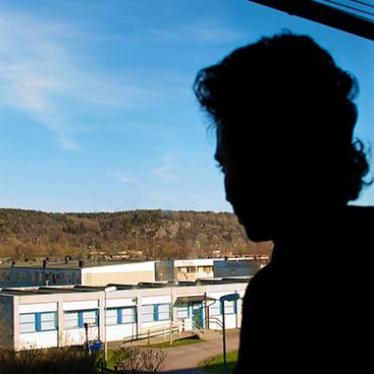A short drive from the orderly streets of the Calais town center, past a series of warehouses and fuel stations, is one of the most startling scenes in modern Europe: the squalid, sprawling, overcrowded migrant camp often called the “Jungle.”
Before this week, as many as 10,000 asylum seekers and migrants were in the camp, most in tents or ramshackle shelters haphazardly constructed of plywood and other scrap building material, others in an authorized part of the camp living in temporary shelters constructed of converted shipping containers. Most women and girls are housed in a small shelter run by an aid group.
Unaccompanied boys, most from Afghanistan, Sudan, and Eritrea, sleep wherever they can find space. Many have been in the camp for months, hoping to cross the Channel by whatever means possible, usually by sneaking onto a truck.
But on Monday, French authorities started to empty the camp. They say they’ve arranged for alternative accommodation for all unaccompanied children as well as for adults who want to seek asylum in France. The U.K. government has been pressed by Paris and the British parliament to take as many unaccompanied children as possible, particularly those with family ties to Britain. Before the dismantlement began the French interior minister, Bernard Cazeneuve, called on Britain to “fulfil its moral duty.”
The issue is not whether the camp should be disbanded at all, the issue is how it’s done. If the demolitions take place as scheduled, there’s ample reason to doubt that adequate arrangements will be in place for all unaccompanied children.
To start with, it’s not clear that French authorities know how many unaccompanied children are in the camp. Until last week, the official count stood at about 900, a number that was based on spot checks by police during a four-hour period one day each month. Authorities now accept estimates by aid workers, whose more frequent, systematic counts of the camp’s population have found that between 1,300 and 1,600 unaccompanied children are in the camp.
Some children and adults were already being relocated last week to centers elsewhere in France, on buses that left each morning. The lines for these buses formed early, and many people did not get seats.
Britain has accepted that there are approximately 400 or so children from the camp who qualify for relocation on the basis of their close family ties to the United Kingdom. As of Monday, 235 children had arrived on its shores before transfers were “paused” for the camp to be cleared and demolished.
Britain could admit a lot more than 400, if the government had the political will, and already has a provision in its immigration law that allows it to accept unaccompanied children on humanitarian grounds. When that provision became law earlier this year, lawmakers spoke of taking in thousands of unaccompanied children from across Europe.
After months of foot-dragging on both sides of the Channel, French and British officials are now trying to move too quickly, and making obvious mistakes. For example, instead of attempting to work through aid groups at the outset to conduct an orderly registration process, officials abruptly opened registration on October 14 by announcing over loudspeakers that all unaccompanied children should present themselves at the container area, the authorized section of the camp, if they wanted to travel to the United Kingdom.
Predictably, the result was chaotic, not helped by the fact that officials initially told some children that their family relationships did not qualify for transfer. That afternoon, a new announcement instructed some of those turned away in the morning to return. By midweek, after several days of confusion, officials realized they would be better off enlisting the help of aid groups to identify unaccompanied children.
Even without these missteps, it’s clear that at the current pace of relocation, hundreds of unaccompanied children will still be in the camp as demolitions begin. French authorities do not appear to me to have a realistic plan for what will happen to unaccompanied children who are not transferred to Britain or relocated elsewhere in France.
Authorities have begun to move the remaining unaccompanied children into converted containers in the authorized area of the camp before demolishing the rest. Several hundred adult migrants remain in these temporary shelters. Evicting these adults may prove contentious.
French authorities expect to house about 600 children in the containers, many fewer than the number now living in the camp and far short of the total number who remain. And even if French authorities are able to clear the containers and find enough space for all remaining unaccompanied children, it’s far from clear that arrangements are in place to provide for their care and wellbeing.
Nearly all children, as well as adult migrants in the camp, see the U.K. as their desired destination—and are willing to travel there as stowaways on trucks, shipping containers, and trains, if necessary.
Unaccompanied children are not immediately deported when they reach the U.K. But asylum applications from Afghan and Eritrean children are often denied, despite the risks they face in their home countries, and the Home Office seeks to deport them when they turn 18.
Unaccompanied children from these and other countries are far more likely to receive asylum or other status in France, but many are unaware of that option. Children who do seek asylum in France face formidable bureaucratic obstacles and protracted delays. Poor treatment at the hands of police also dissuades them from applying for asylum in France, children and aid workers have repeatedly told me this week.
French authorities should ensure that all unaccompanied children have alternative care and accommodation before the camps are fully demolished. For its part, the U.K. government should accept humanitarian transfers as well as transfers based on family ties.
Many children in Calais are on their own and far from home. Many have been preyed upon en route to the camps. All have endured significant hardship.
Above all, they are children. The French and British authorities should make sure that their response is guided by that simple truth.










